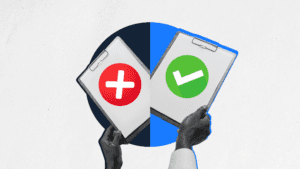We all have our bad days, right? You know, those days where you feel quite down, so you have an entire 16-inch pizza to yourself, or those days where you’re convinced that a little, or not-so-little, retail therapy will fix everything. Then again, we also have our good days, where you celebrate a certain milestone, and end up treating yourself to the latest gadget in town, knowing you can’t quite afford it just yet.
Now, can you guess what both those kinds of days have in common? Well, it’s that instant wave of regret, realizing that once again, you’ve caved to impulse buying. Unsurprisingly, shoppers make at least one impulse purchase each week, so it’s no wonder you’re over-indulging yourself at times.
You see, this ‘impulse buying’ is what we also define as ‘emotional spending’, and emotional spending and regret increasingly go hand in hand. But, that doesn’t mean you have to stop spending money. Rather, you just have to stop being guided by emotions and wasting money on things you don’t really need.
If you find yourself routinely having a hard time trying to control your spending, then here’s what you need to know about emotional spending, and how to stop this unhealthy habit.

What Is Emotional Spending?
Before you can break emotional spending habits, it’s best first to understand what it is. At its core, emotional spending is when your heightened emotions get the best of you. This type of spending commonly stems from emotions like stress, jealousy, guilt, sadness, or achievement.
Let’s be a bit more specific. You’re having a rough day. The cure? A new handbag, a pair of sneakers, or maybe even the latest smartphone. You tell yourself it’s no big deal, you just want something nice to make yourself feel good – and you’re right.
Truth is, retail therapy has been proven to help reduce sadness, as shopping releases “happiness” hormones, like dopamine, that boost our mood. However, after that initial feeling subsides, emotional spending almost always leads to regret, all while gradually putting your financial health at risk.
Now, there’s absolutely nothing wrong with treating yourself if you can afford it, and as long as it’s within your budget, then why not? The difficulty is that emotional spending can easily get out of control because you’re acting on emotion rather than logic. That means, before you know it, you’ve ordered takeout for the fifth night in a row, unknowingly busting your monthly budget. So, here’s how to fix that:
1. Know Your Triggers
Identifying the emotions that drive you to go on these shopping frenzies will help you break these spending habits. Do you shop out of sheer boredom? After a heated argument? When you’re stressed from work? Next time you get the overwhelming urge to make a purchase, ask yourself how you’re feeling.
Staying aware of your emotional state helps you pinpoint the triggers before you even complete the transaction, allowing you to develop strategies to combat your emotional spending habits.

2. Find Alternative Coping Methods
When we’re dealing with negative emotions, in particular, we naturally look for ways to avoid them and feel good instead, which is why we resort to shopping. But, when you engage in emotional spending, what you’re really after are those positive feelings that come with making a purchase.
That’s why it’s key to find healthier coping mechanisms that release those same “happy” hormones without breaking the bank. For instance, when you feel stress creeping in, you could go for a quick jog, squeeze in a 5-minute meditation, or let it all out in a journal.

3. Stick To A Budget
When you create a budget, you know precisely how much money you have to work with each month. You can start by using the 50/30/20 budgeting rule, where you allocate 50% of your income to essentials, 30% to wants, or non-essentials, and 20% to savings and debt payments.
This rule makes it easier to resist impulse splurges and keep your finances in shape. So, if you’ve got no more money in your Eating Out category, then it’s time for a homemade grilled cheese sandwich. Simple and effective.

4. Limit Temptations
Pesky temptations are everywhere – television, radio, billboards, social media, emails, and so on. How often have you googled an item, only for it to pop up on your Instagram feed the very next day? We’re constantly bombarded with these ads from all angles, and they play on our emotions, making us fall into the emotional spending trap.
So, to reduce emotional spending, limit your exposure to such temptations. You could unsubscribe from marketing emails, so you don’t feel like you’re missing out on special discounts (Yes, sale FOMO is real). You could also delete the shopping apps that you tend to mindlessly browse, as well as reduce the time you spend at shopping malls. You know what they say: out of sight, out of mind!

5. Sleep On It
Before buying something, perhaps it’s best to wait 24 hours, or even longer, to reconsider and ensure you’re spending intentionally. Sometimes, you might realize that you don’t really need the item, helping you swerve another unnecessary purchase! If you find that you still want the item and that it’s within your ‘wants/non-essentials’ budget, then you can go for it.
When you’re feeling that urgency to shop, then simply add the things to a wishlist if you’re online shopping, or keep a want list on your phone of any in-store items you’ve got your eye on. By waiting 24 hours, or more, you’re allowing the emotion to pass, so you can mull over the idea more rationally.

Bottom Line
Treating yourself every now and then is therapeutic, to say the least, but when you’re spending beyond your means and straining your finances in the process, then there’s an issue here. After all, emotional spending can become an unhealthy, ongoing habit that produces short-lived happiness only.
The first step to overcoming emotional spending is being aware of your impulsive tendencies to make yourself feel good, albeit temporarily. By using some of the tips we’ve provided, like creating a budget and limiting exposure to temptations, you can shop more consciously, save more money, alleviate financial stress, and ultimately, dodge that regret over what was going to be just another short-term mood booster. Trust us, the thrill of reaching your long-term financial goals is far more gratifying than going on yet another shopping spree!






